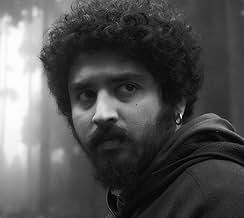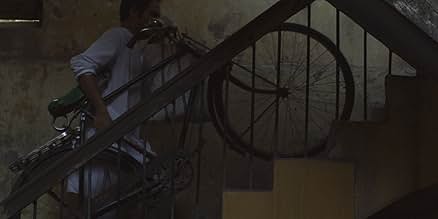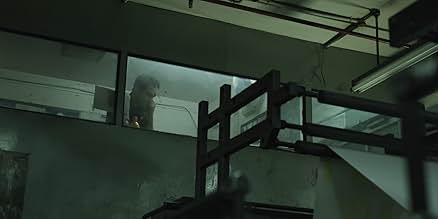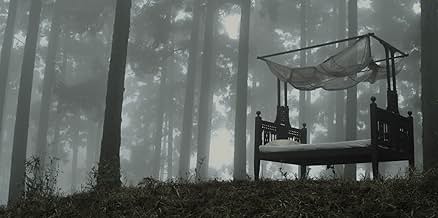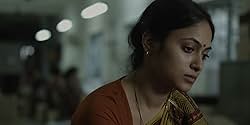AVALIAÇÃO DA IMDb
7,9/10
1,4 mil
SUA AVALIAÇÃO
Este filme lírico conta a história de duas vidas comuns suspensas pela dureza de uma recessão interminável. O casal está preso a um ciclo de trabalho e rotina doméstica, além da longa espera... Ler tudoEste filme lírico conta a história de duas vidas comuns suspensas pela dureza de uma recessão interminável. O casal está preso a um ciclo de trabalho e rotina doméstica, além da longa espera no silêncio de uma casa vazia.Este filme lírico conta a história de duas vidas comuns suspensas pela dureza de uma recessão interminável. O casal está preso a um ciclo de trabalho e rotina doméstica, além da longa espera no silêncio de uma casa vazia.
- Direção
- Roteirista
- Artistas
- Prêmios
- 3 vitórias e 7 indicações no total
Basabdatta Chatterjee
- Woman
- (as 'Basabdutta Chatterjee')
Avaliações em destaque
I chanced upon the Iranian indie filmmaker Keywan Karimi's short film "Zan Va Shohar Karega" (The Adventure of the Married Couple) a few years ago. In spite of the obvious likeness, I prefer Aditya Vikram Sengupta's directorial debut.
The beauty of this film lies in the little things - the poetic collage of images ordinary lives are made of; artfully rendered and helmed with nuanced realism - every frame relatable, every moment pure, doused in everything Bengali.
Basabdatta Chatterjee outdoes the ever so brilliant Ritwick Chakraborty, so gracefully subtle in her expressions.
Arthouse films tend to be pretentious, mostly unappealing to us commoners, trying too hard to please global audiences. Asha Jaoar Majhe is a rarity; an unequivocal feat of grounded filmmaking.
The beauty of this film lies in the little things - the poetic collage of images ordinary lives are made of; artfully rendered and helmed with nuanced realism - every frame relatable, every moment pure, doused in everything Bengali.
Basabdatta Chatterjee outdoes the ever so brilliant Ritwick Chakraborty, so gracefully subtle in her expressions.
Arthouse films tend to be pretentious, mostly unappealing to us commoners, trying too hard to please global audiences. Asha Jaoar Majhe is a rarity; an unequivocal feat of grounded filmmaking.
In this dialogue less movie, Aditya Sengupta depicts grim condition and awkward work shifts of a married couple. In this 74 minutes film everything is visually narrated with precision from the beautiful yet crowded back lanes of Kolkata to their struggle. "There is an internal beauty in silence": Asha Jaoar Majhe definitely symbolizes that. Asha Jaoar Majhe won two national awards in 2014. The film is available on Prime Video. Also watch Aditya's another minimal gem "Jonaki" on Netflix.
The movie is pretty brilliantly directed, the first half of the movie actually sets the stage for the second half. It highlights the life of a common man in the suburbs of Kolkata, though the movie doesn't have any dialogues but it speaks thousands of words. Both the male and the female protagonist act exemplarily well.
"Asha Jawar Majhe" or "Labour of Love" is as much an ode to a recession hit Calcutta as much it is an eulogy of the rigors in a lower middle class couple's struggle for existence,yet united by love for few treasured moments in a day. The film is exclusively a silent film, yet more eloquent than any of its recent contemporaries. The brilliance and scale of the film can only be matched in recent times by a "Ship of Theseus" and rightfully it has won accolades over the International Festivals.
The viewer who goes in search of a story will be thoroughly disappointed as this is just a portrayal of a day in the life of this struggling couple essayed beautifully by Ritwick and Basabdutta, both working in alternate shifts to make their ends meet. But they are not love-lost, as they wait with honed self control and relentless patience for the early morning hours of union,when he returns from work and she is about to set out to. The "labour of love" is thus not fruitless, but is the strong bond that ties this couple,estranged for most of the day,owing to a debilitating economy.
It is totally a Director's film,executed brilliantly by the helmsman Aditya Vikram Sengupta, as his camera pans the North Calcutta suburbs, reminiscent of erstwhile opulence,yet now symbolic of a moribund state,through a poet's eye. Kudos to him for handling the plot with such sensitivity , as even the director had to undergo a Labour of Film Making to make his first film. The use of light and shadow reminds of Ray's "Aporajito" and the sound arrangement is nothing short of brilliant. But there are certain unexplained jump cuts and long stills too, flaws which doesn't remain with the viewer after the wonderful ending of the film. Ritwick has indeed become the "Irrfan Khan" of Tollywood in recent times and no one could play this role more convincingly.The vacant stare, the unhurried way he carries out his daily mundane routine, and yet the wait for the Golden moments of the day underplaying in his eyes is brilliant. He shows that one can portray despair without a sigh. Basabdutta complements him on all grounds. A final word for the sound arrangement as the film would have been incomplete without its brilliant execution,specially when there's no dialogue. It is a must watch for cine enthusiasts,poets and others who have an ebbing poet in them amidst the harsh realities of life. Looking forward to more such classics from the director in future.
The viewer who goes in search of a story will be thoroughly disappointed as this is just a portrayal of a day in the life of this struggling couple essayed beautifully by Ritwick and Basabdutta, both working in alternate shifts to make their ends meet. But they are not love-lost, as they wait with honed self control and relentless patience for the early morning hours of union,when he returns from work and she is about to set out to. The "labour of love" is thus not fruitless, but is the strong bond that ties this couple,estranged for most of the day,owing to a debilitating economy.
It is totally a Director's film,executed brilliantly by the helmsman Aditya Vikram Sengupta, as his camera pans the North Calcutta suburbs, reminiscent of erstwhile opulence,yet now symbolic of a moribund state,through a poet's eye. Kudos to him for handling the plot with such sensitivity , as even the director had to undergo a Labour of Film Making to make his first film. The use of light and shadow reminds of Ray's "Aporajito" and the sound arrangement is nothing short of brilliant. But there are certain unexplained jump cuts and long stills too, flaws which doesn't remain with the viewer after the wonderful ending of the film. Ritwick has indeed become the "Irrfan Khan" of Tollywood in recent times and no one could play this role more convincingly.The vacant stare, the unhurried way he carries out his daily mundane routine, and yet the wait for the Golden moments of the day underplaying in his eyes is brilliant. He shows that one can portray despair without a sigh. Basabdutta complements him on all grounds. A final word for the sound arrangement as the film would have been incomplete without its brilliant execution,specially when there's no dialogue. It is a must watch for cine enthusiasts,poets and others who have an ebbing poet in them amidst the harsh realities of life. Looking forward to more such classics from the director in future.
Many of us, specifically people of Bengal residing out of Bengal , are in a habit of crying out loud most of the time saying "Ei Bangalir dwara ar kissu hobe na [ Nothing good ll happen by these Bongs ]". But then something like this happens and you start wondering - would it be possible by any other person apart from a Bengali !? I have my doubts.
"Labour of love" or "Asha Jawar Majhe" - it is nowhere close to the very idea of film that we usually have in our mind. The 84 min journey is mundane,monotonous,banal in all its senses - but then you ll realize it is just depicting a single day of our very own life which itself is of the same nature.
This film has only two characters and none of them has a single dialogue. Because conversation is not mandatory to capture neither the repetitiveness of our daily chores nor those few special moments [ a window - one can say here ] for which we gather the energy to complete our hackneyed routine.
The level of detail of this film - I could not recall a single colored Bengali film which have the same. When the camera unusually zooms in and lingers over the seemingly insignificant things - the cracked wall, the sunset, the clothesline, the revolving cycle - it surely test viewer's patience but also tells a story - a story where everyone of us is fighting our daily battle to survive ; Sorry , not "to survive" , but "to love". The whole slow-pace was just an intriguingly exquisite build-up for the last 5 poetic min, where we comes to realize that - yes, to cherish just a few moments of love, we are being able to continue our vapid journey; we are ready to be a "Labour of Love".
Aditya Vikram Sengupta - What have you created!!!!
NOTE: Not in a mood to go into the insipid details of direction,camera,cinematography,sound or acting cause if all these have not been perfect, THIS experience wouldn't have been created at the very first place.
"Labour of love" or "Asha Jawar Majhe" - it is nowhere close to the very idea of film that we usually have in our mind. The 84 min journey is mundane,monotonous,banal in all its senses - but then you ll realize it is just depicting a single day of our very own life which itself is of the same nature.
This film has only two characters and none of them has a single dialogue. Because conversation is not mandatory to capture neither the repetitiveness of our daily chores nor those few special moments [ a window - one can say here ] for which we gather the energy to complete our hackneyed routine.
The level of detail of this film - I could not recall a single colored Bengali film which have the same. When the camera unusually zooms in and lingers over the seemingly insignificant things - the cracked wall, the sunset, the clothesline, the revolving cycle - it surely test viewer's patience but also tells a story - a story where everyone of us is fighting our daily battle to survive ; Sorry , not "to survive" , but "to love". The whole slow-pace was just an intriguingly exquisite build-up for the last 5 poetic min, where we comes to realize that - yes, to cherish just a few moments of love, we are being able to continue our vapid journey; we are ready to be a "Labour of Love".
Aditya Vikram Sengupta - What have you created!!!!
NOTE: Not in a mood to go into the insipid details of direction,camera,cinematography,sound or acting cause if all these have not been perfect, THIS experience wouldn't have been created at the very first place.
Você sabia?
- CuriosidadesThere are no words spoken by the characters in the film.
Principais escolhas
Faça login para avaliar e ver a lista de recomendações personalizadas
- How long is Labour of Love?Fornecido pela Alexa
Detalhes
- Tempo de duração
- 1 h 24 min(84 min)
- Cor
- Proporção
- 2.35 : 1
Contribua para esta página
Sugerir uma alteração ou adicionar conteúdo ausente


